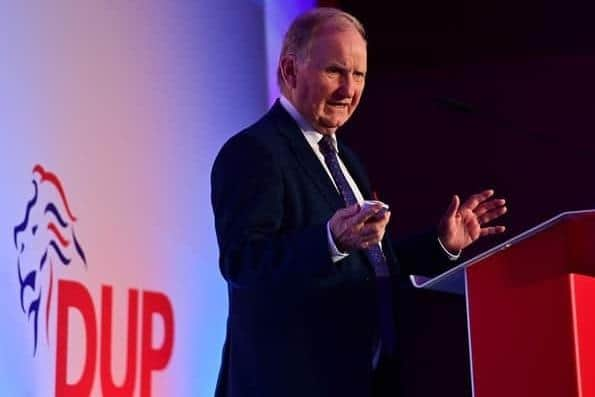DUP chairman Lord Morrow insists the party's tests for reviving Stormont have not been met yet ahead of major party executive meeting this week - adding that they will judge the British government on actions, not promises
and live on Freeview channel 276
Party leader Sir Jeffrey Donaldson had said that the meeting will cover merely “routine business”, as opposed to focussing on the merits – or otherwise – of ending the Stormont boycott.
There has been vague reports in recent months of growing disquiet in the DUP ranks over the open-ended nature of the boycott, but this has been dismissed on-the-record by some DUP figures.
Advertisement
Hide AdAdvertisement
Hide AdFor example, Carla Lockhart MP told the News Letter in August that "there is absolutely no split, and the party will move forward on a united footing and front”; however, she also added it would be “foolish" to imagine there would not be a “conversation” on the issue.


Speaking ahead of the DUP meeting in Lurgan, Lord Morrow stressed that the whole party wants to get back into Stormont – but that its tests for doing so have not been met yet.
He told the News Letter that the Lurgan meeting is one of four annual executive gatherings, and will involve some 130 or so people: the MLAs, MPs, and regional delegates from the local DUP associations.
It has been in the diary for a month, he added.
Lord Morrow, who has been chairman of the DUP for roughly the last 23 years, was insistent that “there’s no big news going to come out of it… I’m being real and honest with you, there’s no big news coming – absolutely none”.
But will the question of a return to Stormont come up?
Advertisement
Hide AdAdvertisement
Hide Ad“I’d imagine the party leader would just update people on where things are and what conversations he’s had with government.
“The ball is firmly in the government’s court: they know what they have to do, and why don’t they get on with it?
“The government [needs to meet] our tests. That’s it. It couldn’t be any simpler.
“Government has some papers from us. They haven’t responded to them, as yet. And that’s it.
Advertisement
Hide AdAdvertisement
Hide Ad“They’ve said many things in the past – and we know how that all turned out.
“So we don’t judge government any more on what they say: it’s on what they do.”
What of the reports in recent times about a split in the DUP, with some people wanting to get back to Stormont?
“We all want back to Stormont. That’s the party’s policy. But government’s holding it up. Someone needs to ring the NIO and ask why.
Advertisement
Hide AdAdvertisement
Hide Ad“But we’re not going back til there’s a level playing field.
"Everybody is supposed to be equal, but it looks like some are going to be more equal than others, and we’re not tolerating that.”
The idea of “equal citizenship” has become a unionist rallying cry in reaction to the Protocol and its later addendum, the Windsor Framework, with TUV leader Jim Allister recently saying that the aim must be “equal citizenship with everyone else in the UK, in being governed only by laws made in our own country”.
As for what the DUP’s tests are for returning to Stormont, back in 2021 Sir Jeffrey Donaldson set out seven criteria by which any solution to the Protocol will be judged.
Advertisement
Hide AdAdvertisement
Hide AdThese included the following: A solution must “fulfil Article 6 of the Acts of Union”, “avoid any diversion of trade”, “not set up an effective border in the Irish Sea between Ireland and the UK”, and “result in ‘no checks on goods going from NI to GB or from GB to NI’ (and remaining in NI)”.